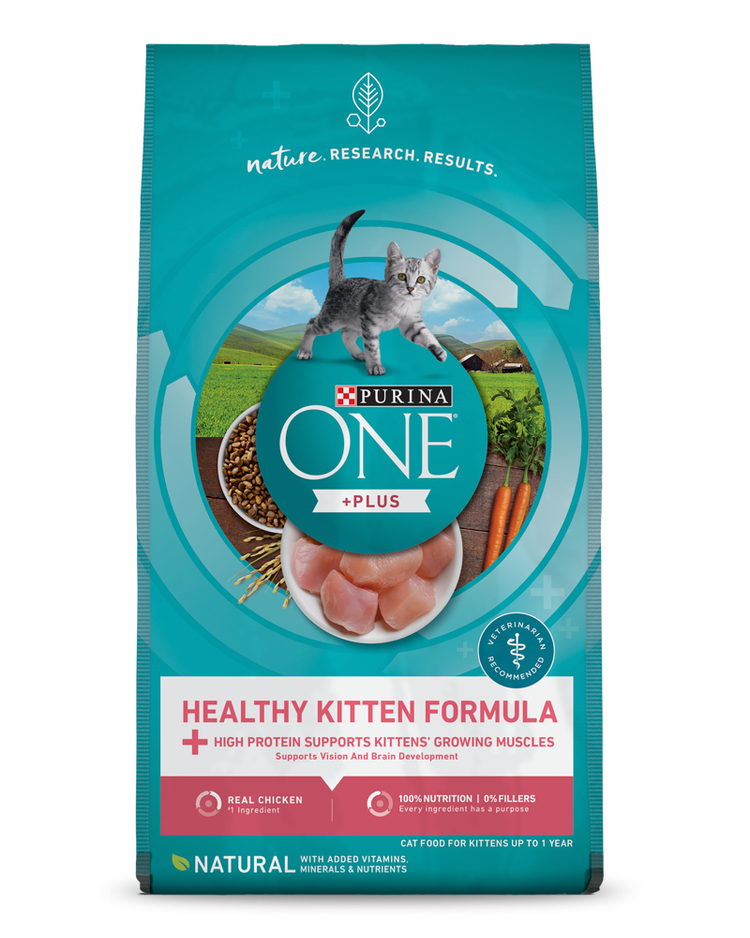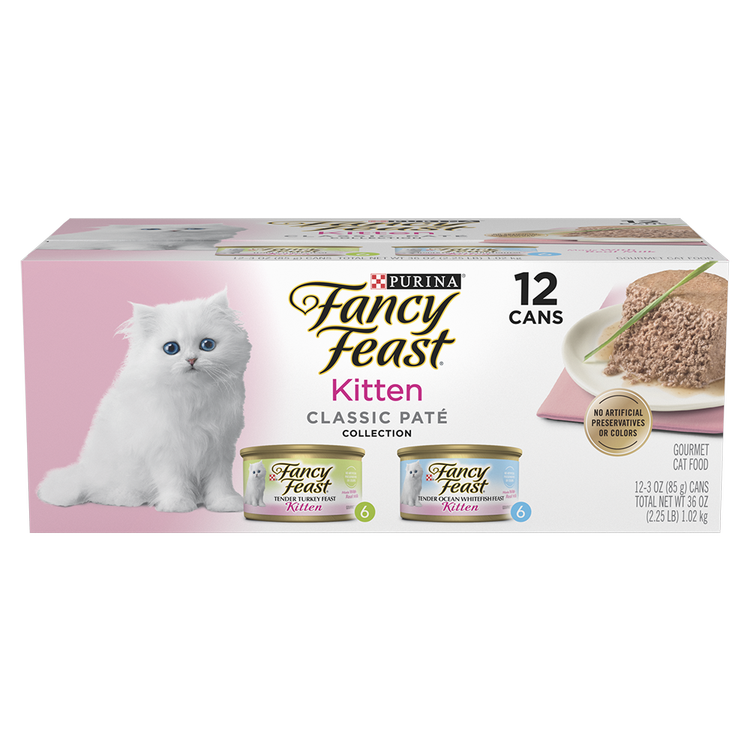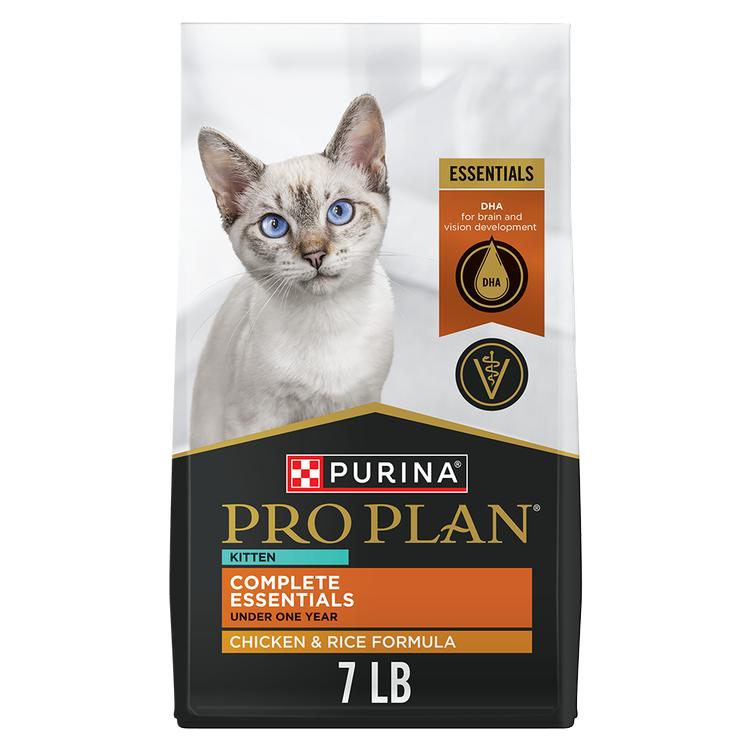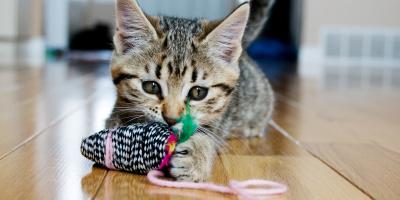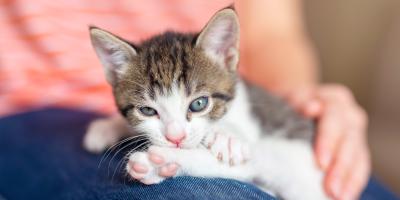What to Feed a Kitten: Best Food at Each Age

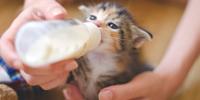
Nothing captures hearts quite so quickly (and completely) as a new kitten. If one has joined your family (and consequently captured yours), you of course want to do everything you can to help them grow into a healthy and happy adult feline companion.
As a new kitten “parent,” an essential aspect of care to consider is what to feed a baby kitten?
Why is the question of how to feed kittens so important? The biggest reason is because your tiny kitten has a huge amount of growing to do during their first year. In fact, within six months kittens can achieve 75% of their adult body mass! To help support this rapid growth, your kitten needs a diet rich in nutrients and formulated to promote kitten health and development.
What Do Newborn Kittens Eat?
For the first four to six weeks, Mother Nature provides the perfect nourishment for kittens, in the form of mother’s milk. Rich in protein and minerals, this is a food that is naturally complete and perfectly balanced to meet all of a kitten’s nutritional needs.
What to Feed Newborn Kittens in an Emergency
If a mother cat, also known as a queen, is unable to provide adequate nourishment for a kitten, it’s important to know how to feed newborn kittens. Some signs that a kitten might not be getting enough milk include:
- Restlessness
- Persistent crying
- Failure to gain weight, or weight loss
Kittens who cannot nurse should be fed a commercial feline milk replacement formula to supply nutrition similar to a queen’s milk. They should not be fed cow's milk, or a formula made for human babies.
Once they reach five-to-seven weeks, kittens are ready for weaning, and the gradual transition to solid kitten food. An important way their bodies prepare for this transition is by developing what are referred to as their “milk teeth.”
These first teeth start to appear at around four weeks of age. By the time kittens are about six weeks old they will have a full set of 26 teeth. These will serve them until they are about six months old, when they are replaced by 30 permanent teeth.
What’s the Best Food for Your Kitten?
Once your kitten has transitioned to solid food, it’s time to choose the best food for kitten health as your furry youngster grows.
The best food for kittens is one formulated specifically to support that growth during their first year, and not adult cat food, which doesn’t meet a kitten’s nutritional needs. Your formula choice should include:
- High levels of protein kittens need for proper development
- A higher level of calories than adult cat food
- Calcium, magnesium, phosphorous, zinc and iron at appropriate levels to help build strong bones and teeth
- Extra vitamin C and vitamin E for immune system support
- DHA to help support healthy brain and vision development
The food you choose to feed your kitten should also be complete and balanced for kitten growth. Purina offers many forms and flavors of kitten food, including dry and wet varieties, to delight and nourish all types of kittens.
Unless your veterinarian has recommended a specific type of food for your kitten, the choice of a dry or wet food is yours (and theirs, of course!).
Dry Food for Kittens
A quality dry kitten food offers benefits beyond nutrition to support your kitten’s health:
- They are easy to measure, so you can easily serve just the amount your kitten needs
- Once they are opened, they stay fresh longer than canned food
- Crunching on the kibble can help keep your kitten’s teeth clean and healthy
- Smaller kibble, sized for kittens, are easy to chew and swallow compared to adult kibble
Wet Food for Kittens
Wet kitten food is another appealing option for kittens, for some very good (and tasty) reasons:
- It has a stronger aroma than dry food, which can be enticing for kittens
- Its softer texture can make it easier for young and teething kittens to chew
- The extra water in wet food increases your kitten’s hydration
- Single-serve pouches and trays make it convenient to give your kitten a fresh meal every time
Free Feeding Kittens
When your kitten is young is the perfect time to introduce them to different types of foods. To help prevent finicky behavior as they get older, you may want to introduce your kitten to a variety of food textures during their first few months, as long as it doesn’t upset their tummy.
This is a good time for this kind of exploration because after kittens get older, they can become less receptive to trying new foods.
Free feeding is also an option for kittens younger than four months, although canned food should not be left in their dish for more than an hour. As your kitten’s growth starts to slow, or around the time you have your kitten spayed or neutered, experts recommend transitioning to meal feeding, with recommended serving amounts. Meal feeding is an important way to help your kitten avoid issues with obesity during their adult years.
Feeding Kittens Milk
Kittens are able to break down lactose from their mother’s milk, thanks to an enzyme in their stomachs. By the time they reach adulthood, most cats have become lactose intolerant, so consuming dairy products might cause diarrhea.
For weaned kittens, milk is not a substitute for a solid food diet that is complete and balanced for kittens. And the best hydration option to accompany that diet is not cow’s milk, but an always-available bowl of fresh water.
The Path to a Healthy Life Begins at Your Kitten’s Bowl
By starting your kitten off with a nutritious and balanced diet, and helping them develop proper eating habits, you’ll be providing them with more than quality meals. You’ll be giving them an essential foundation for a future transition to adult cat food, and support for a healthy and happy life.
For more expert tips on feeding your kitten, explore our other kitten feeding articles.

Find Your Pet’s Perfect Food
Get your personalized recommendation with our Pet Food Finder tool.

